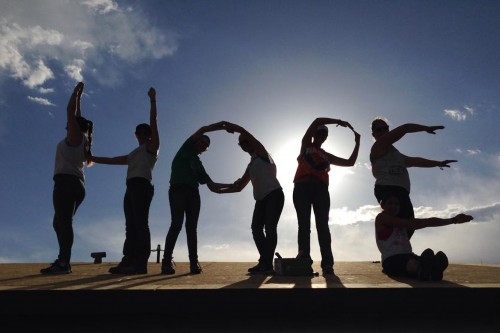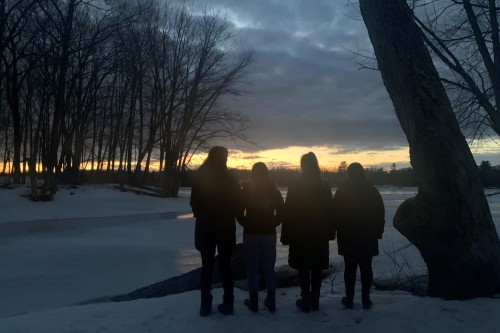H.O.P.E.: An Education for the Mind, Heart and Soul
Students in Stonehill’s service immersion program travel near and far, learning as much about themselves as they do about the suffering endemic in today’s world.
Within minutes of stepping outside St. Andre Bessette Catholic Church in Portland, Oregon, two Stonehill students saw the first of what would be a steady stream of unhoused residents coming their way.
The students, participating in the College’s H.O.P.E. service immersion program, were navigating a cafeteria cart piled with bagged lunches over the bumpy sidewalks of the city’s Old Town neighborhood.
Neither they nor their staff chaperone knew what to expect from the pending interaction. But a piece of advice offered by Fr. Randy Rentner, C.S.C., at a Mass before the volunteers headed out, strengthened both their courage and compassion: “Treat each person you meet as if they might be Jesus in disguise.”
Since its founding in 1997, the H.O.P.E. program has regularly offered students the opportunity to travel to domestic and international destinations to deepen their understanding of pressing social issues and to lend a hand in providing the services that help lessen the suffering of vulnerable populations. The four letters in the acronym H.O.P.E. encapsulate the program’s mission: honoring our neighbor, organizing for justice, practicing peace, encountering God.
In Maine, students learn about the history of the Wabanaki Confederacy and the societal and practical challenges that the Native American cultural alliance faces. In West Virginia, they learn about the environmental impact of coal mining and volunteer in local food pantries, soup kitchens and community gardens in some of the poorest sections of Appalachia. And in Peru, they engage in a 10-day immersion in Canto Grande, one of the most impoverished areas of the nation’s capital, where the Congregation of Holy Cross established a ministry in 1977.
Recognizing Humanity in All Whom We Encounter
The five students on this year’s excursion to Portland were there to learn about the agencies and organizations that serve people, often in the grip of drug addiction and/or mental health issues, who live on the city’s streets.
H.O.P.E. Portland is hosted by St. Andre Bessette Church, which – like Stonehill – is part of the Congregation of Holy Cross. In addition to their time spent in the community, students and their staff chaperones live at the church for the week, helping with maintenance projects, serving community meals and staffing its clothing center and food pantry.
On that first day of distributing bagged lunches, the students – who fanned out in twos and threes – came face-to-face with the innumerable emotional, physical and psychological challenges of those they were there to help. But the first encounter established a foundational understanding that would be reinforced throughout their week: the desire to feel like and be treated like a human being.
The man they met told the students about a group of late-night revelers knocking over his tent and yelling at him the previous night. When handed one of the bags from the cart, he said, “Thank you for this. It’s exhausting always being treated like a criminal or an animal.”
John O. Fahie ’26 was with two other Stonehill students moving another cart of lunches through the neighborhood and the images of that day have stuck with him. “My time in Portland opened my eyes to the struggles that so many people have to endure on a daily basis,” he said. “I now see these people as warriors, and I want to support them in their battle against homelessness and addiction because every human has dignity.”
The trips are transformational in so many ways; it is hard to even describe the change that happens within our students in such a short time. They begin to see issues and communities in a new way. They develop a more complex understanding and a greater sense of compassion, empathy and inspiration from those they serve and meet.
Deepening Compassion, Expanding Knowledge and Gaining Leadership Skills
H.O.P.E. is not only a manifestation of the College’s mission, anchored by a belief in the inherent dignity of each person. The program also provides students with valuable leadership skills, enhances their executive functioning skills and broadens their knowledge of the world around them.
Colleen Schoeck, campus minister for service immersion, runs the H.O.P.E. program and has witnessed the immense impact it has on students.
“The trips are transformational in so many ways; it is hard to even describe the change that happens within our students in such a short time,” she says. “They begin to see issues and communities in a new way. They develop a more complex understanding and a greater sense of compassion, empathy, and inspiration from those they serve and meet.”
The enormity of the experience is one of the reasons for the nightly reflections that are held on all H.O.P.E. excursions. These provide an opportunity for students to process all that they’ve experienced on any given day and share the thoughts and feelings that spring from those encounters. Engagement continues when students return to campus. Lectures, reunions and local service opportunities all work to keep that sense of compassion alive long after their immersion.
“H.O.P.E. gives a unique opportunity for us to connect with other students and staff from all across campus, focus on issue areas that really matter, and reflect on ways that we can better use our resources to serve others,” said Lucy Frenette ’25, one of two student leaders on the Portland trip. “My experience with H.O.P.E. is always incredible, and my trip to Portland was no different.”
RELATED STORIES
-

At a preserve on sacred Wabanaki land in Maine, the history, traditions, and struggles of Indigenous People in North America come to life.

